
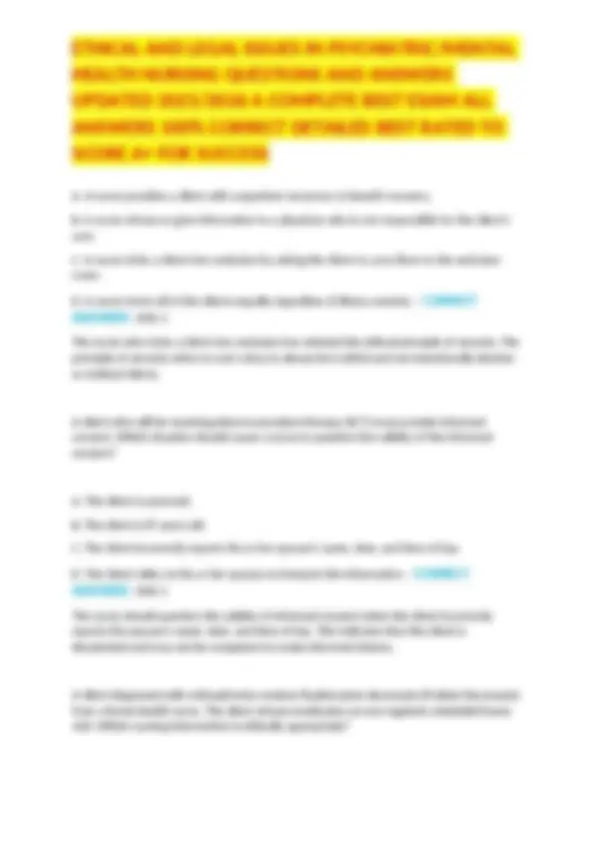
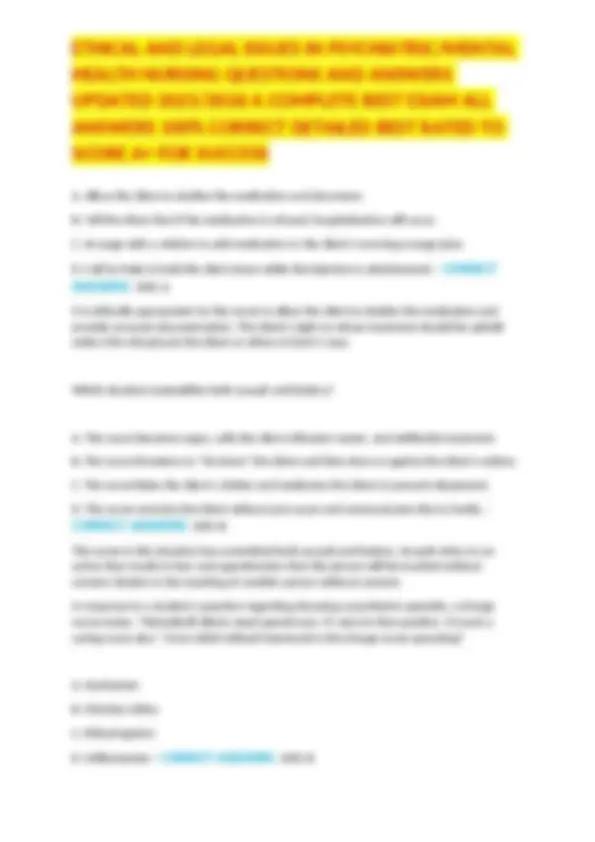
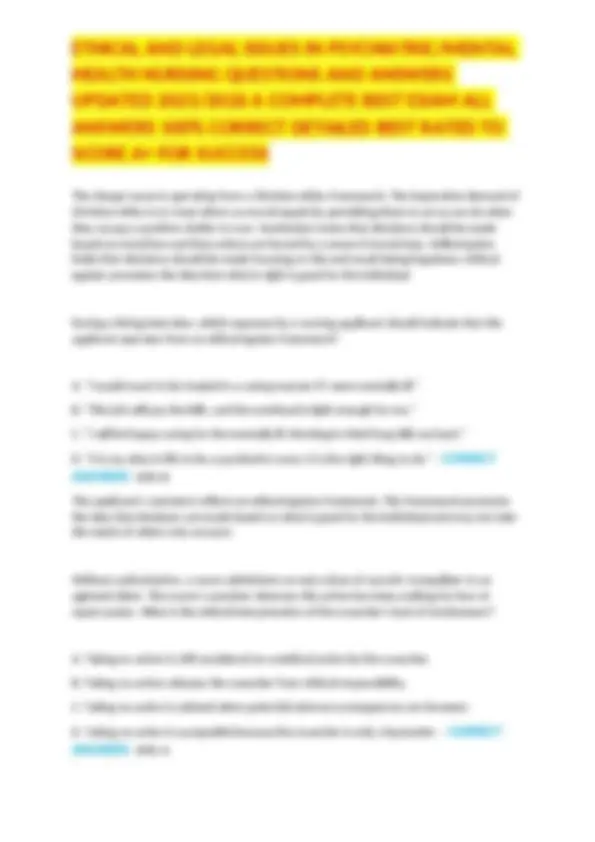
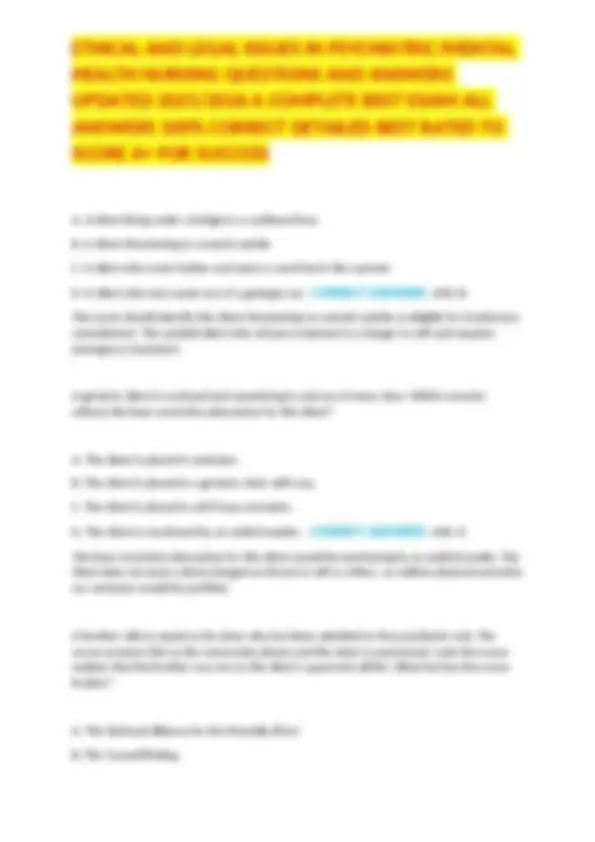
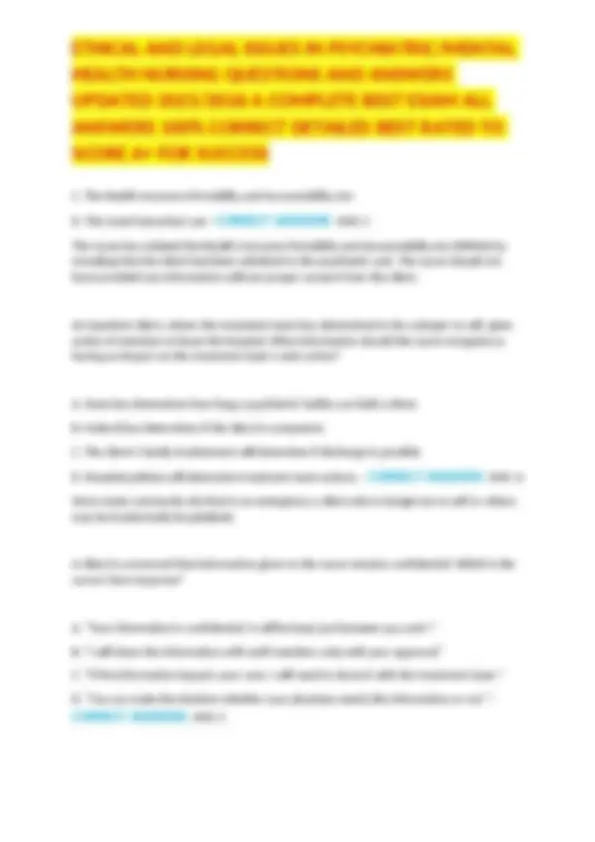
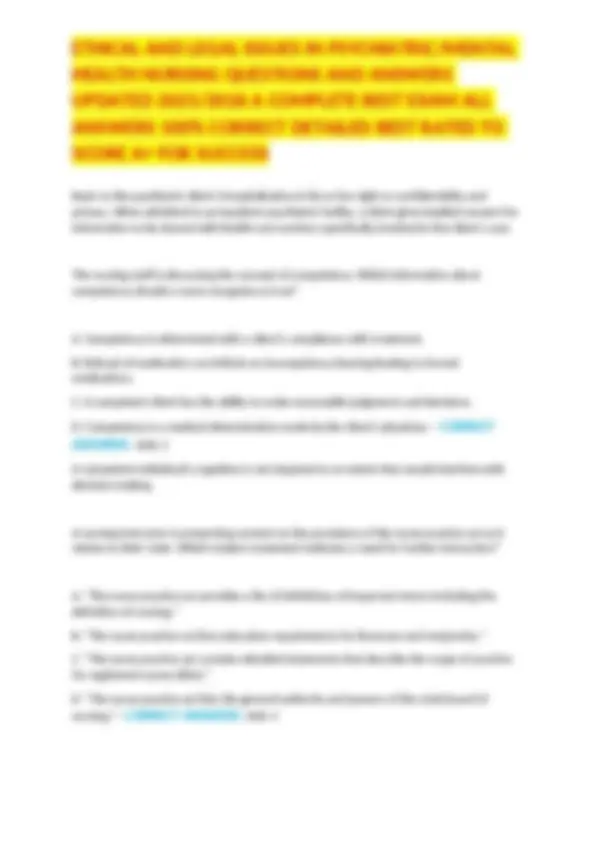
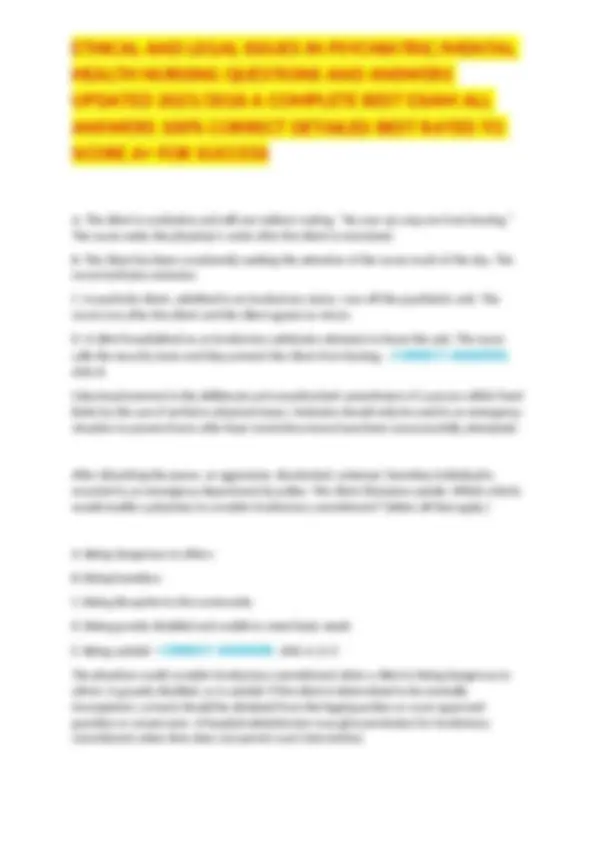


Study with the several resources on Docsity

Earn points by helping other students or get them with a premium plan


Prepare for your exams
Study with the several resources on Docsity

Earn points to download
Earn points by helping other students or get them with a premium plan
Community
Ask the community for help and clear up your study doubts
Discover the best universities in your country according to Docsity users
Free resources
Download our free guides on studying techniques, anxiety management strategies, and thesis advice from Docsity tutors
ETHICAL AND LEGAL ISSUES IN PSYCHIATRIC/MENTAL HEALTH NURSING QUESTIONS AND ANSWERS UPDATED 2025/2026 A COMPLETE BEST EXAM ALL ANSWERS 100% CORRECT DETAILED BEST RATED TO SCORE A+ FOR SUCCESS
Typology: Exams
1 / 13

This page cannot be seen from the preview
Don't miss anything!








A client diagnosed with schizophrenia refuses to take medication, citing the right of autonomy. Under which circumstance would a nurse have the right to medicate the client against the client's wishes? A. When the client makes inappropriate sexual innuendos to a staff member B. When the client constantly demands inappropriate attention from the nurse C. When the client physically attacks another client after being confronted in group therapy D. When the client refuses to bathe or perform hygienic activities - CORRECT ANSWERS ANS: C The nurse would have the right to medicate a client against his or her wishes if the client physically attacks another client. This client poses a significant risk to safety and is incapable of making rational choices. The client's refusal to accept treatment can be challenged because the client is endangering the safety of others. A psychiatric nurse working on an inpatient unit receives a call asking if an individual has been a client in the facility. Which nursing response reflects appropriate legal and ethical obligations? A. Refusing to give any information to the caller, citing rules of confidentiality B. Refusing to give any information to the caller by hanging up C. Affirming that the person has been seen at the facility but providing no further information D. Suggesting that the caller speak to the client's therapist - CORRECT ANSWERS ANS: A The most appropriate action by the nurse is to refuse to give any information to the caller. Admission to the facility would be considered protected health information (PHI) and should not be disclosed by the nurse without prior client consent.
A client requests information on several medications in order to make an informed choice about management of depression. A nurse should provide this information to facilitate which ethical principle? A. Autonomy B. Beneficence C. Nonmaleficence D. Justice - CORRECT ANSWERS ANS: A The nurse should provide the information to support the client's autonomy. A client who is capable of making independent choices should be permitted to do so. In instances when clients are incapable of making informed decisions, a legal guardian or representative would be asked to give consent. An inpatient psychiatric physician refuses to treat clients without insurance and prematurely discharges those whose insurance benefits have expired. Which violation of an ethical principle should a nurse recognize in this situation? A. Autonomy B. Beneficence C. Nonmaleficence D. Justice - CORRECT ANSWERS ANS: D The nurse should determine that the ethical principle of justice has been violated by the physician's actions. The principle of justice requires that individuals should be treated equally regardless of race, sex, marital status, medical diagnosis, social standing, economic level, or religious belief. Which situation reflects the ethical principle of veracity?
A. Allow the client to decline the medication and document. B. Tell the client that if the medication is refused, hospitalization will occur. C. Arrange with a relative to add medication to the client's morning orange juice. D. Call for help to hold the client down while the injection is administered. - CORRECT ANSWERS ANS: A It is ethically appropriate for the nurse to allow the client to decline the medication and provide accurate documentation. The client's right to refuse treatment should be upheld unless the refusal puts the client or others in harm's way. Which situation exemplifies both assault and battery? A. The nurse becomes angry, calls the client offensive names, and withholds treatment. B. The nurse threatens to "tie down" the client and then does so against the client's wishes. C. The nurse hides the client's clothes and medicates the client to prevent elopement. D. The nurse restrains the client without just cause and communicates this to family. - CORRECT ANSWERS ANS: B The nurse in this situation has committed both assault and battery. Assault refers to an action that results in fear and apprehension that the person will be touched without consent. Battery is the touching of another person without consent. In response to a student's question regarding choosing a psychiatric specialty, a charge nurse states, "Mentally ill clients need special care. If I were in that position, I'd want a caring nurse also." From which ethical framework is the charge nurse operating? A. Kantianism B. Christian ethics C. Ethical egoism D. Utilitarianism - CORRECT ANSWERS ANS: B
The charge nurse is operating from a Christian ethics framework. The imperative demand of Christian ethics is to treat others as moral equals by permitting them to act as we do when they occupy a position similar to ours. Kantianism states that decisions should be made based on moral law and that actions are bound by a sense of moral duty. Utilitarianism holds that decisions should be made focusing on the end result being happiness. Ethical egoism promotes the idea that what is right is good for the individual. During a hiring interview, which response by a nursing applicant should indicate that the applicant operates from an ethical egoism framework? A. "I would want to be treated in a caring manner if I were mentally ill." B. "This job will pay the bills, and the workload is light enough for me." C. "I will be happy caring for the mentally ill. Working in Med/Surg kills my back." D. "It is my duty in life to be a psychiatric nurse. It is the right thing to do." - CORRECT ANSWERS ANS: B The applicant's comment reflects an ethical egoism framework. This framework promotes the idea that decisions are made based on what is good for the individual and may not take the needs of others into account. Without authorization, a nurse administers an extra dose of narcotic tranquilizer to an agitated client. The nurse's coworker observes this action but does nothing for fear of repercussion. What is the ethical interpretation of the coworker's lack of involvement? A. Taking no action is still considered an unethical action by the coworker. B. Taking no action releases the coworker from ethical responsibility. C. Taking no action is advised when potential adverse consequences are foreseen. D. Taking no action is acceptable because the coworker is only a bystander. - CORRECT ANSWERS ANS: A
An involuntarily committed client is verbally abusive to the staff and repeatedly threatening to sue. The client records the full names and phone numbers of the staff. Which nursing action is most appropriate to decrease the possibility of a lawsuit? A. Verbally redirect the client, and then limit one-on-one interaction. B. Involve the hospital's security division as soon as possible. C. Notify the client that documenting personal staff information is against hospital policy. D. Continue professional attempts to establish a positive working relationship with the client. - CORRECT ANSWERS ANS: D The most appropriate nursing action is to continue professional attempts to establish a positive working relationship with the client. The involuntarily committed client should be respected and has the right to assert grievances if rights are infringed. Which statement should a nurse identify as correct regarding a client's right to refuse treatment? A. Clients can refuse pharmacological but not psychological treatment. B. Clients can refuse any treatment at any time. C. Clients can refuse only electroconvulsive therapy (ECT). D. Professionals can override treatment refusal if the client is actively suicidal or homicidal. - CORRECT ANSWERS ANS: D The nurse should understand that health-care professionals can override treatment refusal when a client is actively suicidal or homicidal. A suicidal or homicidal client who refuses treatment may be a danger to self or others. This situation should be treated as an emergency, and treatment may be performed without informed consent. Which client should a nurse identify as a potential candidate for involuntary commitment?
A. A client living under a bridge in a cardboard box B. A client threatening to commit suicide C. A client who never bathes and wears a wool hat in the summer D. A client who eats waste out of a garbage can - CORRECT ANSWERS ANS: B The nurse should identify the client threatening to commit suicide as eligible for involuntary commitment. The suicidal client who refuses treatment is a danger to self and requires emergency treatment. A geriatric client is confused and wandering in and out of every door. Which scenario reflects the least restrictive alternative for this client? A. The client is placed in seclusion. B. The client is placed in a geriatric chair with tray. C. The client is placed in soft Posey restraints. D. The client is monitored by an ankle bracelet. - CORRECT ANSWERS ANS: D The least restrictive alternative for this client would be monitoring by an ankle bracelet. The client does not pose a direct dangerous threat to self or others, so neither physical restraints nor seclusion would be justified. A brother calls to speak to his sister who has been admitted to the psychiatric unit. The nurse connects him to the community phone and the sister is summoned. Later the nurse realizes that the brother was not on the client's approved call list. What law has the nurse broken? A. The National Alliance for the Mentally Ill Act B. The Tarasoff Ruling
Basic to the psychiatric client's hospitalization is his or her right to confidentiality and privacy. When admitted to an inpatient psychiatric facility, a client gives implied consent for information to be shared with health-care workers specifically involved in the client's care. The nursing staff is discussing the concept of competency. Which information about competency should a nurse recognize as true? A. Competency is determined with a client's compliance with treatment. B. Refusal of medication can initiate an incompetency hearing leading to forced medications. C. A competent client has the ability to make reasonable judgments and decisions. D. Competency is a medical determination made by the client's physician. - CORRECT ANSWERS ANS: C A competent individual's cognition is not impaired to an extent that would interfere with decision making. A nursing instructor is presenting content on the provisions of the nurse practice act as it relates to their state. Which student statement indicates a need for further instruction? A. "The nurse practice act provides a list of definitions of important terms including the definition of nursing." B. "The nurse practice act lists education requirements for licensure and reciprocity." C. "The nurse practice act contains detailed statements that describe the scope of practice for registered nurses (RNs)." D. "The nurse practice act lists the general authority and powers of the state board of nursing." - CORRECT ANSWERS ANS: C
The nurse practice act contains broad, not detailed, statements that describe the scope of practice for various levels of nursing (APN, RN, LPN), not just for the RN. This student statement indicates a need for further instruction. Which is an accurate description of a common law? A. A common law would be invoked to deal with a nurse who, without justification, threatens a client with restraints. B. A common law would be invoked to deal with a nurse who touches a client without the client's consent. C. A common law would be invoked to deal with a hospital employee who steals drugs, hospital equipment, or both. D. A common law would be invoked to deal with a nurse's refusal to provide care for a specific client. - CORRECT ANSWERS ANS: D Common laws apply to a body of principles that evolve from court decisions resolving various controversies. Common law may vary from state to state. Assault (threats) and battery (touch) are governed by civil law. Stealing is governed by criminal law. The experience of being physically restrained can be traumatic. Which nursing intervention would best help the client deal with this experience? A. Administering a tranquilizing medication before applying the restraints B. Talking to the client at brief but regular intervals while the client is restrained C. Decreasing stimuli by leaving the client alone most of the time D. Checking on the client infrequently, in order to meet documentation requirements - CORRECT ANSWERS ANS: B
A. The client is combative and will not redirect stating, "No one can stop me from leaving." The nurse seeks the physician's order after the client is restrained. B. The client has been consistently seeking the attention of the nurse much of the day. The nurse institutes seclusion. C. A psychotic client, admitted in an involuntary status, runs off the psychiatric unit. The nurse runs after the client and the client agrees to return. D. A client hospitalized as an involuntary admission attempts to leave the unit. The nurse calls the security team and they prevent the client from leaving. - CORRECT ANSWERS ANS: B False imprisonment is the deliberate and unauthorized commitment of a person within fixed limits by the use of verbal or physical means. Seclusion should only be used in an emergency situation to prevent harm after least restrictive means have been unsuccessfully attempted. After disturbing the peace, an aggressive, disoriented, unkempt, homeless individual is escorted to an emergency department by police. The client threatens suicide. Which criteria would enable a physician to consider involuntary commitment? (Select all that apply.) A. Being dangerous to others B. Being homeless C. Being disruptive to the community D. Being gravely disabled and unable to meet basic needs E. Being suicidal - CORRECT ANSWERS ANS: A, D, E The physician could consider involuntary commitment when a client is being dangerous to others, is gravely disabled, or is suicidal. If the client is determined to be mentally incompetent, consent should be obtained from the legal guardian or court-approved guardian or conservator. A hospital administrator may give permission for involuntary commitment when time does not permit court intervention.